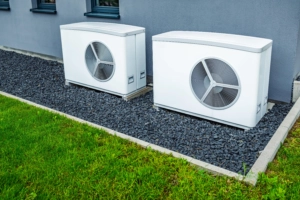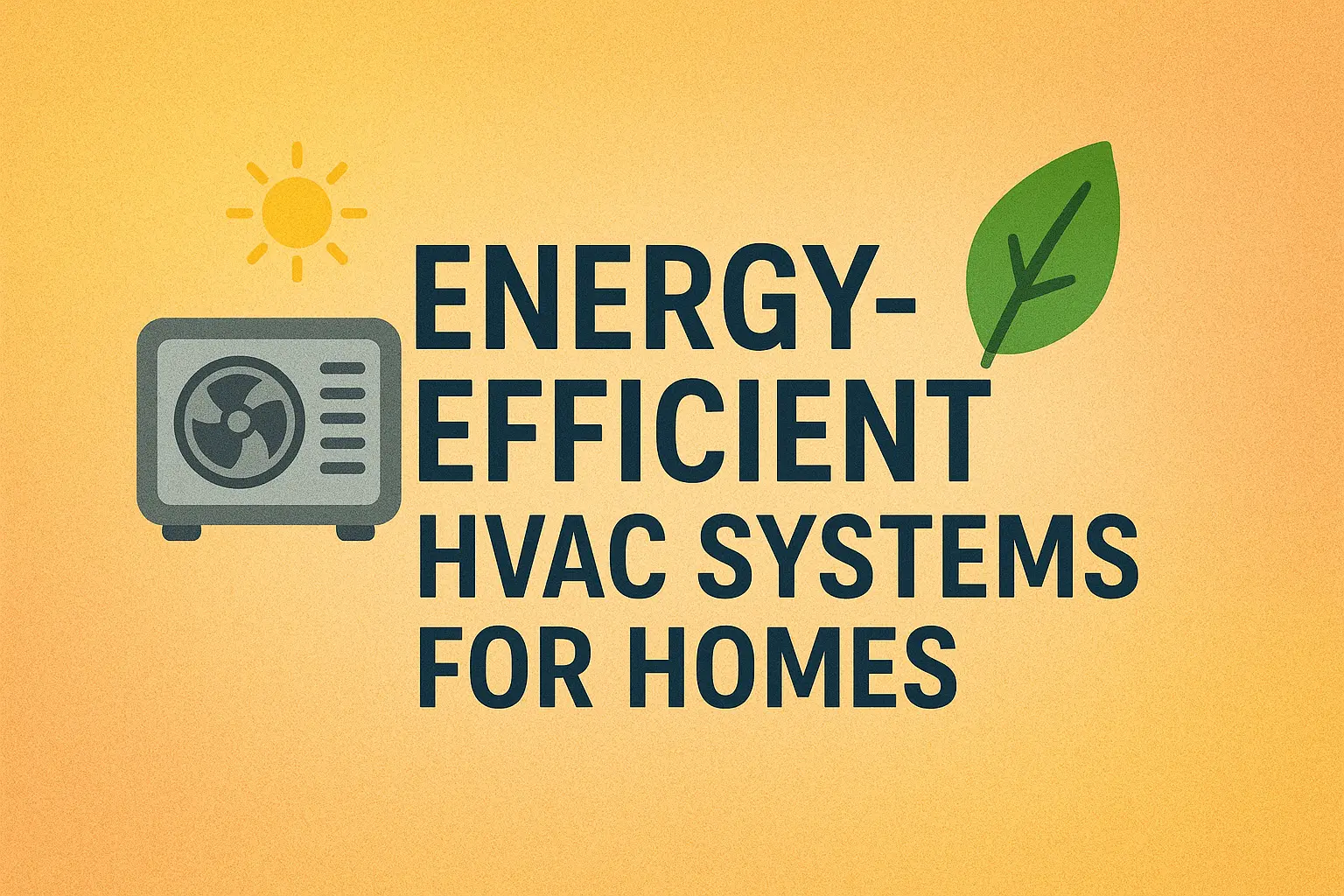Choosing the correct HVAC system for your house sometimes can feel very confusing, due to the fact that every brand you see is claiming to be energy efficient. To help you in making a confident decision, a simple guide is here now on the most energy-efficient HVAC systems for homes.
The top systems are including the ductless mini split heat pumps, also air source heat pumps, the geothermal heat pumps, and high efficiency furnaces which are used together with smart thermostats. These systems use inverter technology and variable speed compressors, helping you save energy while keeping your home comfortable in all seasons.
We will now look next at which system fits your home and climate in a more good way.
Top 5 Energy-Efficient HVAC Systems for Homes
If you are planning to upgrade or install a new HVAC system, selecting one that brings balance to comfort, efficiency, and cost is the key. Below you will find a breakdown of the top five energy-efficient HVAC systems in 2025, with explanation of how each works, the advantages and disadvantages, and which home types and climates they will suit best. This section will help you in selecting the right system that saves energy without making the comfort suffer.
1. Air-Source Heat Pump
- Overview: Air-source heat pumps are moving heat instead of generating it, offering efficient heating and also cooling in one whole system.
- Pros: Energy Star certified options are available, running costs are low, the system is working for both heating and cooling, it is easy to maintain.
- Cons: Slightly less effective when it is extremely cold unless a backup heat source is paired with it.
- Best for: Climates that are mild to moderate.
2. Ductless Mini-Split System
- Overview: For homes which do not have ductwork, these systems are the ideal choice; they allow zoned temperature control for individual rooms.
- Pros: Efficiency is excellent, operation is quiet, it is customizable for a number of rooms, energy loss through ducts is reduced.
- Cons: The upfront cost is higher, and multiple units inside the house may change the room design.
- Best for: Older homes, or apartments, or for additions to a room.
3. Geothermal Heat Pump
- Overview: It uses the constant temperature of the earth to heat and also cool your house in a way that is highly efficient.
- Pros: Extremely energy efficient, operating costs are low, the lifespan is long, the carbon footprint is reduced.
- Cons: The cost for installation is high, it needs a suitable land area for the ground loops.
- Best for: Homeowners with outdoor space and plans for long-term living.
4. Variable-Speed Central AC & Gas Furnace Combo
- Overview: This is a dual system that adjusts the compressor speed automatically to keep consistent comfort inside.
- Pros: Cooling and heating are efficient, temperatures are even, performance is quiet, ideal for homes that are large.
- Cons: Initial cost is higher, and installation is best done by a professional.
- Best for: Homes in areas with summers that are hot and winters that are cold.
5. Hybrid Electric + Gas HVAC
- Overview: It combines the efficiency of an electric heat pump with the power of a gas furnace, giving you the best from both worlds.
- Pros: It switches between gas and electricity automatically for efficiency that is optimal, energy bills are reduced for the whole year.
- Cons: Maintenance is slightly more complex because of the two fuel sources.
- Best for: Regions that have climates that are variable.
Comparison Table
| System Type | Efficiency Rating | Ideal Climate | Average Cost (USD) | Estimated Lifetime Savings |
| Air-Source Heat Pump | SEER 18–22 | Mild to moderate | $6,000–$9,000 | Up to $10,000–$12,000 |
| Ductless Mini-Split | SEER 20–26 | Any (zoned control) | $4,500–$8,000 | $8,000–$10,000 |
| Geothermal Heat Pump | SEER 30+ | Any (with ground access) | $12,000–$25,000 | $20,000–$30,000 |
| Variable-Speed Central AC & Furnace | SEER 18–20 | Hot and cold climates | $9,000–$15,000 | $10,000–$15,000 |
| Hybrid Electric + Gas HVAC | SEER 17–20 | Variable climates | $8,000–$13,000 | $9,000–$14,000 |
Each of these systems is giving unique benefits depending on the layout of your home, its location, and what your energy goals are. In the next section, we will have a discussion on how to choose the right HVAC system for your home based on the budget, the climate, and the long-term energy savings.
The Demand Which is Rising for Energy-Efficient Comfort

HVAC systems, the words stand for heating, ventilation, and air conditioning, they are what keep your home comfortable in every season. In 2025, efficiency is important now more than it ever was, because the prices of energy are continuing to rise and also sustainability has become a greater concern for all homeowners.
Efficient HVAC systems are reducing the monthly bills, they also lower the carbon emissions, and they make your living space much more comfortable. Since HVAC systems are using almost 48% of all home energy, the choice of an energy-efficient one can make a difference which is very big for both your savings and also the environment.
Why Energy Efficiency Matters for Home HVAC Systems
Energy-efficient HVAC systems assist you to save money because the monthly utility bills will be lower and they reduce the carbon footprint of your home. They are providing consistent comfort through temperatures that are steady and operation that is quieter, while also extending the life of the system by making the wear and tear less. Homes that have efficient HVAC systems are often enjoying higher property values and are attractive to modern buyers, who value sustainability and also smart design. In summary, investing in efficiency means comfort in the long-term, savings, and a house that is greener.
Understanding HVAC Energy Ratings (SEER, HSPF, AFUE & More)
Before you are buying a new HVAC system, it is important to understand the energy ratings. SEER is what measures the efficiency of cooling, HSPF measures the performance of a heat pump, and AFUE shows how efficiently a furnace converts its fuel into heat. The new standards like SEER2 and HSPF2 (2023–2025) have established benchmarks that are stricter for real-world efficiency. You should always check the yellow EnergyGuide label, not just what the marketing claims. A common mistake that homeowners are making is to judge the efficiency by the brand alone instead of the verified performance ratings.
What Makes an HVAC System Energy-Efficient?
The efficiency of an HVAC system is depending on its technology, the structure, and its maintenance. Systems that have variable-speed motors, inverter compressors, and smart thermostats use a lesser amount of power while they keep the temperatures stable. Good ductwork design, insulation, and a home that is well-sealed prevent the loss of energy and also make the performance better. Maintenance that is regular, such as filter cleaning, checking levels of refrigerant, and scheduling professional tune-ups, keeps the system running smoothly. These factors, when together, help in lowering the use of energy, extending the system’s life, and keeping comfort all through the year.
New & Emerging HVAC Technologies Homeowners Should Know

HVAC technology in 2025 is moving forward fast, assisting homeowners to save more energy and to reduce the emissions. Here are the innovations that are key and are making a real difference:
- Smart Zoning Systems: These divide your home into zones, allowing each room to have its own control over temperature. This practice avoids heating or cooling spaces that are not used and is cutting the energy waste.
- AI-Powered Thermostats: These thermostats learn your daily habits, adjusting temperatures automatically, and they are tracking energy use to keep comfort high and costs low.
- Eco-Friendly Refrigerants (R-454B, R-32): New refrigerants are replacing older ones which are harming the environment. They cool efficiently while they are reducing greenhouse gas emissions.
- Solar and Smart Grid Integration: Some HVAC systems are now connecting directly to solar panels or smart grids, which allows homes to use clean, renewable energy.
- IoT Monitoring and Predictive Maintenance: Sensors are tracking performance in time that is real and they alert you about potential problems before any breakdowns are happening, which improves efficiency and extends the life of the system.
How to Choose the Right System for Your Home
Begin by matching your HVAC system to your climate, the size of your home, and the layout. You need to decide if a ducted or ductless setup is what you require, and after that, you compare efficiency ratings like SEER2 and HSPF2. Always you must choose an installer who is certified and who performs a Manual J load calculation to size your system correctly. Avoid the common mistakes such as oversizing the equipment or forgetting about insulation, because both of these are reducing efficiency and comfort. The correct system should fit the needs of your home, not only the square footage.
Cost vs. Savings : The Real ROI of an Efficient HVAC System
Energy-efficient HVAC systems may be costing more at the beginning, but they quickly give return through bills for utility that are lower and reduced costs for maintenance. Most homeowners are seeing a full return on investment (ROI) within 3 to 7 years.
For an example, upgrading to a heat pump with high-efficiency can save up to 30% on energy use annually. Servicing that is regular also keeps the performance high and the expenses low, which turns your HVAC system into an investment for the long-term that is smart for both your finances and your comfort.
Rebates, Tax Credits, and Local Incentives (2025 Updates)
In 2025, homeowners can save even more money by making use of rebates and tax credits for when they install HVAC systems that are energy-efficient. In the United States, you should check the ENERGY STAR Rebate Finder and the website of your local utility provider. For the United Kingdom, visit the UK Energy Saving Trust for programs that are current. In Australia, you can explore the Energy.gov.au rebates and assistance page. Choosing an ENERGY STAR-certified HVAC system will not only boost the efficiency but can also qualify you for incentives that are larger, cutting the upfront costs and the bills for energy in the long term.
HVAC Efficiency for Different Climates
Climate is playing a major role in the selection of the correct energy-efficient HVAC system. In areas that are hot and humid, such as Florida or South Asia, inverter-based systems with built-in dehumidification are working the best. Cold climates are benefiting from dual-fuel systems that are combining a heat pump with a gas furnace for warmth that is steady and energy use that is lower. In areas that are dry or are deserts, evaporative coolers and variable-speed air conditioners are giving efficient cooling without the waste of power or moisture.
Maintenance Checklist to Keep Efficiency High
Maintenance that is regular keeps your HVAC system efficient and also reliable. You must clean or replace the air filters every month to maintain a good airflow. Seasonally, you need to check the settings of the thermostat, clear the outdoor units, and inspect the ductwork for any leaks. Once a year, schedule professional servicing to test the levels of refrigerant, tighten the electrical connections, and clean the coils. Use smart thermostats or home apps for setting maintenance reminders that are automatic. Care that is consistent not only extends the system life but also makes sure your HVAC is running at peak energy efficiency all year long.
Common Myths About Energy-Efficient HVAC Systems
Many homeowners still believe a few myths about HVAC systems that are energy-efficient. One myth that is common is that systems that are bigger cool or heat faster, but units that are oversized are actually wasting energy and are wearing out quickly. Another myth is that efficient systems do not need maintenance, yet servicing that is regular is extremely important to keep the performance high. Finally, some people think that heat pumps are failing in cold climates, but modern models with inverter technology are working efficiently even when temperatures are freezing.
Environmental Benefits Beyond Your Home
HVAC systems that are energy-efficient are doing more than just cutting your utility bills. They are reducing the demand for energy overall on the power grid, which lowers the carbon emissions and protects natural resources. By choosing systems that are high-efficiency or ENERGY STAR-certified, homeowners are supporting sustainability goals and standards for green building. Just like when you choose the best roofing materials for climates that are hot, investing in an efficient HVAC system is helping to regulate comfort inside while minimizing the impact on the environment, creating a home that is greener and more sustainable for every person.
FAQs: Energy-Efficient HVAC Systems for Homes (2025 Edition)
- What is the most energy-efficient HVAC system for homes in 2025?
The top systems include air-source heat pumps, ductless mini-splits, geothermal heat pumps, and hybrid electric-gas systems. They deliver high efficiency with lower operating costs. - How much can I save with an energy-efficient HVAC system?
Most homeowners save 20%–40% on energy bills annually, depending on system type, climate, and home insulation. - What is SEER2 and why does it matter?
SEER2 is the updated cooling efficiency standard introduced in 2023. It gives a more accurate measure of real-world performance, helping you choose the most efficient model. - Do heat pumps work in cold climates?
Yes, modern inverter heat pumps are designed to perform efficiently even in freezing temperatures, often paired with backup heating for extreme conditions. - Are energy-efficient HVAC systems worth the cost?
Yes. Though installation costs are higher, the long-term savings, rebates, and lower maintenance quickly offset the investment within 3 to 7 years. - How often should I service my HVAC system?
Schedule professional maintenance once a year, and clean or replace filters every month to keep efficiency high. - Can I install an energy-efficient HVAC system myself?
No. Proper sizing, refrigerant handling, and load calculations require licensed professionals. Incorrect installation can lower efficiency and void warranties. - What rebates or tax credits are available in 2025?
Homeowners can find current offers on the ENERGY STAR Rebate Finder or regional programs like the UK Energy Saving Trust and Energy.gov.au. - What’s the average lifespan of an energy-efficient HVAC system?
Most modern systems last 15–20 years with proper maintenance and care. - How do I know if my current HVAC system needs an upgrade?
If your system is over 10 years old, struggles to maintain temperature, or causes rising energy bills, upgrading to a newer, energy-efficient model can provide significant savings.
About the Author
Written by Waqar Ahmad Khan, founder of DIY Flooring Ideas and a passionate advocate for smart, sustainable home upgrades. Waqar helps homeowners, renters, and DIYers make informed choices about improving comfort and efficiency in their homes. With hands-on experience in energy-efficient renovations and practical HVAC insights, he focuses on solutions that balance performance, savings, and sustainability, empowering readers to create homes that are both comfortable and eco-friendly.



